Attending the seminar, SASS representatives included Prof., Dr. Wangzhen, Vice President of SASS; Prof. Shen Yuliang and Assoc. Prof., Dr. Peng Yu, Institute of World Economy; Dr. Wang Genxiang, Director of UN’s Project Office; Mr Lu Junrong, Director of Research Department, China Centre for International Economic Exchanges; and Dr. Liu Aming, Deputy Director of Office of International Cooperation.
As hosts of the seminar, VASS delegation were composed of Prof., Dr. Pham Van Duc, Vice President of VASS; Dr. Nguyen Xuan Cuong, Director of Institute of Chinese Studies; Prof., Dr. Do Tien Sam, former Director of Institute of Chinese Studies; Assoc. Prof., Dr. Nguyen Huy Hoang, Deputy Director of Insitute of Southeast Asian Studies; Assoc. Prof., Dr Pham Thai Quoc, Deputy Editor-in-Chief of Review of World Economic and Political Issues; and a great many experts, researchers from member institutes of VASS. The seminar was co-chaired by Prof., Dr. Pham Van Duc and Prof., Dr. Wangzhen.
In recent years, trade and economic ties between ASEAN and China have grown exponentially, especially after the signing of the Framework Agreement on Comprehensive Economic Co-operation dated 4th November 2002, aimed to establish the ASEAN – China free trade area (ACFTA) which was expected to come into force in 2010 in Brunei, Indonesia, Malaysia, Philippines, Singapore, Thailand and China, and in 2015 in the four remaining countries, including Cambodia, Laos, Myanmar and Vietnam.
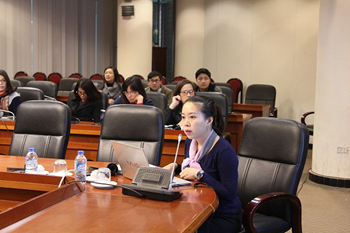 |
|
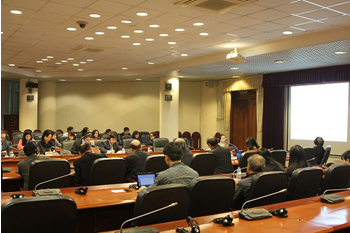 |
The Agreement on Trade in Goods and Agreement on Dispute Settlement Mechanism by the ASEAN-China Economic Ministers as part of the implement ation of the Framework Agreement on Comprehensive Economic Co-operation were signed in Vientiane in November 2004. The Agreement on Trade in Goods came into force from July 2005. The Agreement on Trade in Services was signed at the sidelines of the 10th ASEAN-China Summit in January 2007 in Cebu, Philippines and enter into force on 1st July 2007. The ASEAN-China Trade Negotiating Committee (AC-TNC) concluded the ASEAN-China Investment Agreement in November 2008 and signed this Agreement within the framework of the 41st ASEAN economic ministers meeting in August 2009 in Bangkok, Thailand. This means that the process of negotiations between ASEAN and China on a free trade area was completed in accordance with the Framework Agreement on Comprehensive Economic Co-operation between two sides.
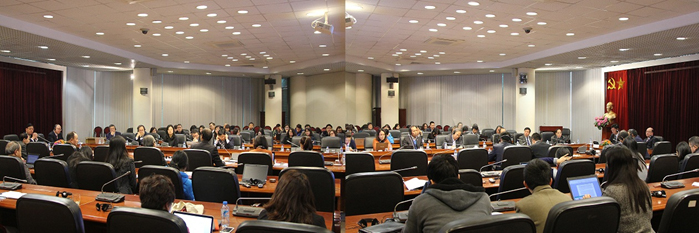 |
In the seminar, there were 3 papers presented by Vietnamese and Chinese scholars. The first paper on “The economic ties between China and ASEAN in the new context’’ by MA. Tran Thi Hai Yen, Institute of Chinese Studies, analysed 3 key points: (1) Factors affecting China-ASEAN economic ties; (2) The current state of affairs of economic ties between China and ASEAN; (3) Opportunities, challenges and trends in economic ties between two countries. She argued that enhancing trade relations between China and ASEAN would enable ASEAN economies to develop, contributing to exploiting ‘geopolitical, geoeconomic’ advantages, reinforcing regional infrastructure connectivity, thereby positively affecting economic growth, reduction of trade costs, promotion of ASEAN’s border trade with China, and above all, achieving a certain degree of balanced regional development.
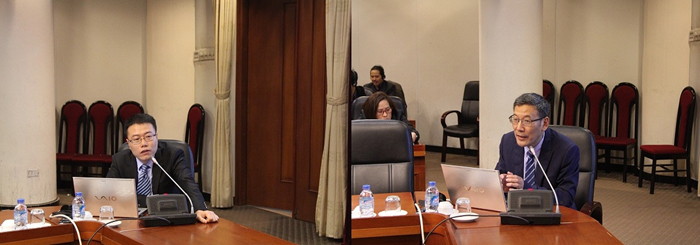 |
Another paper presented by Prof. Shen Yuliang on ‘‘China-Vietnam: Complementation or Substitution?’’ had an analysis on the evolution of trade in Asia and in the world. Prof. Shen ascertained that transnational corporations made countries around the globe attain the balanced trade.
Assoc. Prof., Dr Peng Yu delivered to the seminar his presentation ‘‘New process for rules of Vietnam’s FTAs’’. He emphasised the trends of development in the global FTAs; drawing network comparison of Vietnam’s FTAs in terms of breadth and depth; analysing some areas which are subject to Vietnam’s FTAs; assessing FTAs’ influences on the economy of Vietnam.
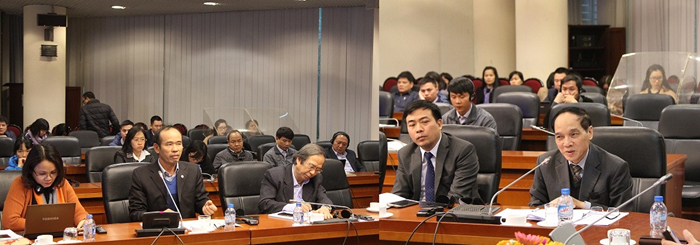 |
The seminar received opinions by delegates discussing following issues: improving the quality of China’s investments in ASEAN and Vietnam; the role of Vietnamese enterprises while joining the Trans-Pacific Partnership Agreement (TPP); implications arising from the American withdrawal from TPP on ASEAN and the China’s role; increasing competitiveness of Vietnam’s small and medium enterprises in exporting goods to China; China’s big tradeoff between environment and economic growth; and so son. For these reasons, emphasis was placed on connections between countries in the region in order to form a community of shared interest as China develops its strategy “One Belt, One Road”.
The seminar was a forum where there were useful academic exchanges and discussions about important issues regarding economic ties between China and ASEAN in general as well as economic ties between China and Vietnam in particular. A wide range of specific issues were put forward by presenters and heatly debated by other scholars in an open and scientifically oriented way.
Summarizing the seminar, Prof., Dr Pham Van Duc expressed his heartfelt gratitude to Prof., Dr Wangzen and SASS scholars for their joining seminar with VASS. He affirmed that the seminar was a first step to advance cooperation in sciences that both sides intended to carry out in the coming years (it is noteworthy that a memorandum of understanding on cooperation was signed between VASS and SASS in 2016). Prof. Duc also expressed his intention to further cooperate with SASS in future conferences at a larger scale. He hoped that this official visit would help SASS delegation better understand the new state of affairs in Vietnam and hence, look forwards to developing cooperation with VASS in many more areas in years to come.
Nguyen Thu Trang







